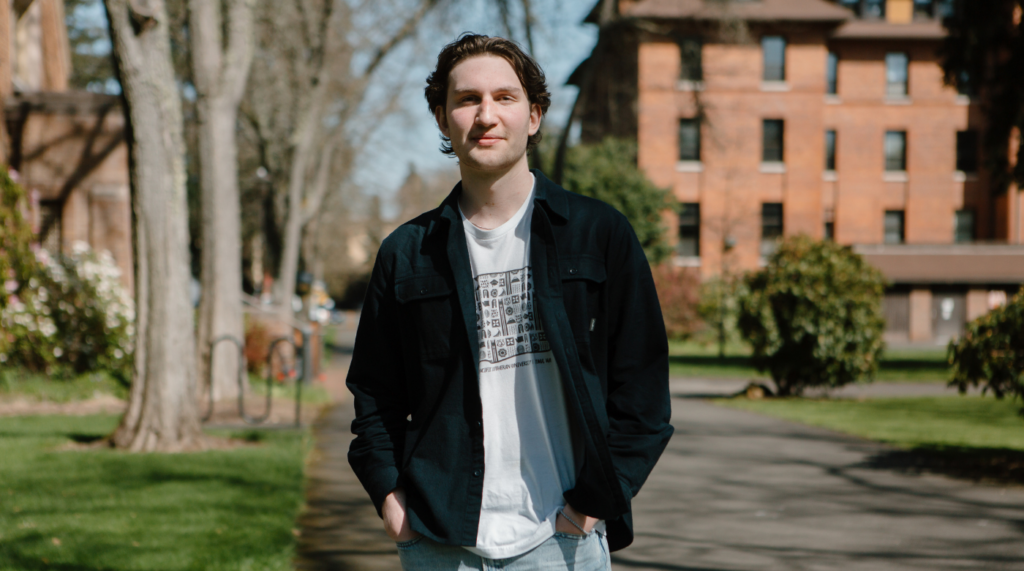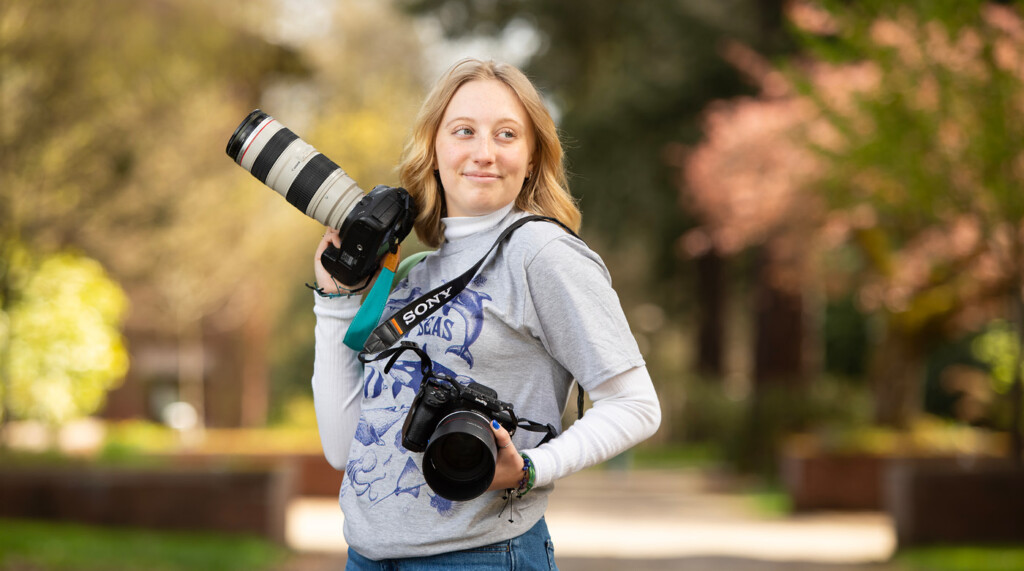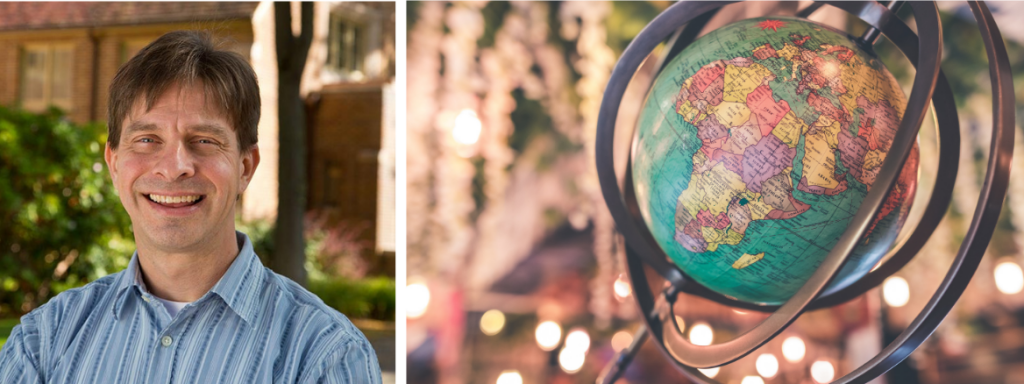Page 56 • (610 results in 0.06 seconds)
-

Travis McDaneld ’23 is entering his fourth year at PLU as an economics major, minoring in data science. When he enrolled at PLU, he had every intention of majoring in business, although he admits to not having any idea about what he wanted to do…
. That’s an amazing opportunity to get to do before I’m even out of college. How did your internship differ from the work you do in the classroom? Often in school, when you’re working with data, it’s very small data sets, but these are really large sets of investment data. It’s good to get experience automating manual processes, which companies with data roles are often looking to do. They want to find out how we can make this process faster and take the human hands out of it, not so that we can
-

Parker Brocker-Knapp ’23 grew up in Portland, but Puget Sound never seemed far—thanks to close family ties to PLU. We sat down with Brocker-Knapp to learn more about how this senior made the most of his time at PLU. How did you choose PLU? I…
through the process, including a mock interview. Faculty are very committed to our success in that way.Hispanic & Latino Studies at PLUThe PLU Hispanic & Latino Studies combines the study of the Spanish language with courses in Latin American, Latino, and Iberian literatures, linguistics, and cultural studies.Why did you choose Hispanic Studies as a major? I was lucky enough to experience a dual-immersion school program from kindergarten until 10th grade, spending half of every day learning Spanish
-

THE PLU ATHLETICS MISSION STATEMENT spells it out. The “S” in Lutes stands for service — giving back and making an impact in the lives of others. It’s a value that two Lute football teammates put into action this past year. Just a few months…
with. “I was surprised to find out during the education process that only 40 percent of the people that were selected as a match ultimately decide to donate,” said Bainter, a kinesiology major from Bothell, Washington. “I would think it would be the other way around and that 60 percent of people chosen would donate.” In March 2023, the all-conference quarterback completed the procedure, laying in a hospital bed for five hours as blood was removed from one arm, passed through a machine that collects
-

Emma Stafki grew up on Washington’s Key Peninsula, hearing stories about a tragedy in 1968. In nearby Vaughn Bay, her grandparents witnessed the heartwrenching capture of Hugo, a three-year-old orca whale. Southern Resident orcas typically stay with their mothers their whole lives; losses echo throughout…
a great shot is challenging. “Orcas can be hard to spot and shoot, while [we’re] being respectful by staying at the required distance,” she says. The process was aided by a large zoom lens and their readiness to drive to a local sighting alert from the Orca Network. “We drove up as quickly as possible, and it worked quite a few times — but they’re fast swimmers.” For the film, Stafki and her sister interviewed PLU biology professor Michael Behrens, the National Oceanic and Atmospheric
-

Highly recruited as an outside hitter out of Chiawana High School, Sianna Iverson ‘24, a talented volleyball player, knew she found a home at PLU after a campus visit. “As soon as I visited, I knew it was going to be a great fit for…
more is involved in the recovery and rehab process.”Rather than participating in drills with the team, she focused on learning about and training her mental resilience as she rehabilitated her knee. She then transitioned her role to student support staff for the volleyball team.“Throughout all of the injuries, she continued to rehab so that she could possibly return to action, and for that, I was in awe at her toughness and persistence,” said PLU Volleyball Coach Kevin Aoki.Iverson explained
-

The French-American Foundation has announced that PLU Professor of French Rebecca Wilkin is one of the winners of the 2024 Translation Prize. Wilkin and her co-editor and translator Angela Hunter, an English professor at the University of Arkansas at Little Rock, received the nonfiction prize…
that recognize the discernment and labor involved in translation. A good translation is invisible, and so translation tends to be an invisible, underappreciated art. Receiving this prize was also very unexpected. Unexpected? Why is that? We never thought of our edition of Dupin’s Work on Women primarily as a translation. The translating we did was just one part –by far the funnest part!– of the project. Oh that’s interesting. Can you share a bit about your process putting this book together? First
-

Growing up in a small town in Idaho, Lorelei Juntunen ’97 had not spent much time in cities. But when she moved to Parkland to attend PLU, she suddenly had access not only to local cities like Tacoma and Seattle, but also to cities across…
residents rather than simply meeting antiquated government standards for affordable housing — Juntunen has designed policies to address rapid growth across the West, including in cities like Missoula and Boise. She’s also been able to work on a project closer to PLU: the process of returning Capitol Lake in Olympia to a natural estuary. With the state paying for dam removal and implementing the rebuilding of an estuary, additional sediment is predicted to flow into Budd Inlet. It’s a question of
-

TACOMA, WASH. (June 27, 2019) — Dr. Jon Grahe’s reach extends around the globe as an open science ambassador. Nearly a decade ago, Dr. Grahe declared that he wanted to change how we study social science. Because of his tireless efforts, a new approach to…
, was created in 2013 by Dr. Grahe, Hans Ijzerman and Mark Brandt. In brief, students attempt to replicate earlier, highly cited studies that are feasible to complete as part of their courses. Students are guided through the process and receive CREP approval by demonstrating transparency in their research. Once enough data have been collected from multiple sites, results are pooled and contributors are encouraged to collaborate on a research paper for publication. In addition, outside investigators
-

Isaiah Banken ’21 knew he wanted to pursue a career in medicine. Banken, with a B.S. in biology and a minor in mathematics from PLU, explored various medical opportunities near his hometown of Wenatchee, WA, including working at a ski resort, serving in hospice care,…
throughout my time at PLU and during the application process to medical school after graduation. I attribute my development as a scientist to Dr. Nervo. I spent two summers researching in her lab, learning an incredible amount, and having a lot of fun. Specific skills such as reading journal articles and interpreting dense figures have helped greatly in medical school. Dave Harvey is one of the biggest reasons I loved rowing at PLU. His coaching helped me develop confidence and approach challenges with
-

Elizabeth Larios ’21 decided she was going to be a neurosurgeon in the fourth grade. That’s when her class took a field trip to a science museum and Larios saw an exhibit about the human brain. Returning home that day, she told her mom: “I’m…
, she told her mom: “I’m going to be a neurosurgeon!” In the following years, her decision was cemented by books she read in middle school classrooms, biology classes she took in high school, and eventually, the teachers and mentors she met at Pacific Lutheran University. Now, the Bonney Lake, Washington native has graduated and earned a prestigious Fulbright research grant — a national award that only 20 percent of applicants receive after a rigorous, year-long application process. In January, she
Do you have any feedback for us? If so, feel free to use our Feedback Form.


